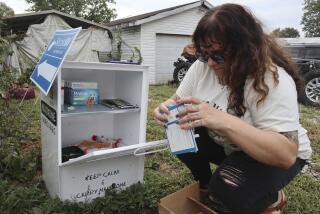Nancy Reagan to Help Drug Centers : Plan for Grants Is Announced During Visit to Pacoima Clinic
Former First Lady Nancy Reagan launched a new phase of her anti-drug crusade during a visit to a Pacoima drug rehabilitation center Thursday, her first visit to a Los Angeles drug center since leaving the White House in January.
After meeting with women clients and their children at Via Avanta drug center, Mrs. Reagan announced that her foundation--formed in January--soon will distribute grants to similar centers in the Los Angeles area. The grants will be small this year, but Mrs. Reagan said if people will contribute, the amount available may grow to support programs across the country.
However, she indicated that she is unlikely to become involved with another Nancy Reagan Center project similar to the one proposed for nearby Lake View Terrace.
“That center is gone, finished,” she said. Asked whether she would consider founding a Nancy Reagan center at another site, she said, “I’ll be busy with the foundation.”
Neighbors’ protests that the proposed 210-bed rehabilitation, research and training center would draw more drugs and crime to their area prompted Mrs. Reagan to withdraw from the project in May.
“The last thing I wanted to do was upset a community,” she said Thursday, reiterating her reasons for backing out after more than a year of negotiations to finance, buy and renovate the former Lake View Medical Center buildings.
However, officials of Phoenix House, the nonprofit company that hoped to make the center the hub of Mrs. Reagan’s “Just Say No” crusade, insist that they are continuing to look for another site for her center.
About $4.3 million in cash and pledges was collected for Phoenix House in Nancy Reagan’s name, according to Suzanne Marx, the national campaign chairman. Use of that money is “still under negotiation,” said John Gustafson, executive director of The Nancy Reagan Foundation. But Gustafson said it probably will never be distributed under the grant program announced Thursday.
Instead, Gustafson said, drug abuse treatment and education centers around Los Angeles are being reviewed as possible grant candidates. He said requests for proposals will go out by the end of the week. He refused to disclose how much money the foundation has raised since January.
Even if a Nancy Reagan Center eventually materializes, Gustafson said it would be just one small piece of Mrs. Reagan’s overall battle against drugs. Mostly, he said, the foundation plans to concentrate its resources on supporting existing programs rather than trying to start new ones.
“There is a lot going on out there,” Gustafson said. “The most important thing in foundation work is not to duplicate efforts.”
Although Via Avanta is not under consideration for a grant this year, Gustafson said the unusual nature of the program led Mrs. Reagan to choose it for her visit. The live-in center is one of a handful in California that caters to women who have children or are pregnant.
“I’ve never seen this kind of a program before . . . they tell me there are a couple of others,” Mrs. Reagan said. “I think it’s very important, especially for young mothers.”
Mrs. Reagan spent nearly an hour with residents Thursday, asking them about their backgrounds and hopes for the future. She admonished them to try to break the addiction cycle by keeping their children off drugs.
Later, she said she was amazed by the severity of abuse, neglect and family drug abuse the women said had led them to drugs.
The residents were equally impressed that Mrs. Reagan chose them. One 26-year-old woman, who said she was a gang member and PCP user for the past 11 years, said, “I’ve watched her make history and here she comes along and she’s interested in us.”
Many of the mothers living at Via Avanta have had their children taken away by authorities because of drug abuse. During the nine- to 18-month program, the center tries to retrieve the children from foster homes and other court-ordered placements once the staff decides the mothers are ready, said Christine Westfall, clinical coordinator.
The children come to live with their mothers at the center, which provides day care, a nursery school and classes for elementary school children. Older children attend nearby public schools.
Program Director Marcellus Robinson said 76% of the women who complete the program remain drug-free for at least a year and only about 20% of them drop out. Robinson attributes the high success rate largely to the motivating influence of their children.
Via Avanta is run by the Didi Hirsch Mental Health Center, which operates five other drug or mental health centers in Los Angeles. The organization was founded in 1942 by the United Hostesses of Beverly Hills, a charitable group. It continues to be funded by the hostesses and by United Way and Los Angeles County.
More to Read
Sign up for Essential California
The most important California stories and recommendations in your inbox every morning.
You may occasionally receive promotional content from the Los Angeles Times.










